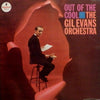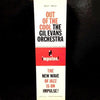



The Gil Evans Orchestra - Out Of The Cool
Gil Evans – piano [click here to see more vinyl featuring Gil Evans]
Johnny Coles – trumpet (soloist)
Phil Sunkel – trumpet
Keg Johnson – trombone
Jimmy Knepper – trombone
Tony Studd – bass trombone (soloist)
Bill Barber – tuba
Ray Beckenstein – alto saxophone, flute, piccolo
Eddie Caine – alto saxophone, flute, piccolo
Budd Johnson – tenor saxophone, soprano saxophone (soloist)
Bob Tricarico – flute, piccolo, bassoon
Ray Crawford – guitar (soloist)
Ron Carter – bass [click here to see more vinyl featuring Ron Carter]
Elvin Jones – drums, percussion [click here to see more vinyl featuring Elvin Jones]
Charlie Persip – drums
1 LP, gatefold old-style tip-on jackets
Original analog Master tape : YES
Heavy Press : 180g
Record color : black
Speed : 33RPM
Size : 12”
Stereo
Studio
Record Press : Quality Record Pressings
Label : Acoustic Sounds Series
Original Label : Impulse
Recorded November 18 & 30, December 10 & 15, 1960 in Van Gelder Studio, Englewood Cliffs, New Jersey
Engineered & mixed by : Rudy Van Gelder
Produced by Creed Taylor
Remastered by Ryan K. Smith
Originally released in 1961
Reissued in 2021
Tracks:
Side A :
- La Nevada
- Where Flamingos Fly
Side B :
- Bilbao Song
- Stratusphunk
- Sunken Treasure
Reviews :
"Out of the Cool, released in 1960, was the first recording Gil Evans issued after three straight albums with Miles Davis -- Sketches of Spain being the final one before this. Evans had learned much from Davis about improvisation, instinct, and space (the trumpeter learned plenty, too, especially about color, texture, and dynamic tension). Evans orchestrates less here, instead concentrating on the rhythm section built around Elvin Jones, Charlie Persip, bassist Ron Carter, and guitarist Ray Crawford. The maestro in the piano chair also assembled a crack horn section for this date, with Ray Beckinstein, Budd Johnson, and Eddie Caine on saxophones, trombonists Jimmy Knepper, Keg Johnson, and bass trombonist Tony Studd, with Johnny Coles and Phil Sunkel on trumpet, Bill Barber on tuba, and Bob Tricarico on flute, bassoon, and piccolo. The music here is of a wondrous variety, bookended by two stellar Evans compositions in "La Nevada," and "Sunken Treasure." The middle of the record is filled out by the lovely standard "Where Flamingos Fly," Kurt Weill-Bertolt Brecht's "Bilbao Song," and George Russell's classic "Stratusphunk." The sonics are alternately warm, breezy, and nocturnal, especially on the 15-plus-minute opener which captures the laid-back West Coast cool jazz feel juxtaposed by the percolating, even bubbling hot rhythmic pulse of the tough streets of Las Vegas. The horns are held back for long periods in the mix and the drums pop right up front, Crawford's solo -- drenched in funky blues -- is smoking. When the trombones re-enter, they are slow and moaning, and the piccolo digs in for an in the pocket, pulsing break. Whoa.
Things are brought back to the lyrical impressionism Evans is most well known for at the beginning of "Where Flamingos Fly." Following a four-note theme on guitar, flute, tuba, and trombone, it comes out dramatic and blue, but utterly spacious and warm. The melancholy feels like the tune "Summertime" in the trombone melody, but shifts toward something less impressionistic and more expressionist entirely by the use of gentle dissonance by the second verse as the horns begin to ratchet things up just a bit, allowing Persip and Jones to play in the middle on a variety of percussion instruments before the tune takes on a New Orleans feel, and indeed traces much of orchestral jazz history over the course of its five minutes without breaking a sweat. "Stratusphunk" is the most angular tune here, but Evans and company lend such an element of swing to the tune that its edges are barely experienced by the listener. For all his seriousness, there was a great deal of warmth and humor in Evans' approach to arranging. His use of the bassoon as a sound effects instrument at the beginning is one such moment emerging right out of the bass trombone. At first, the walking bassline played by Carter feels at odds with the lithe and limber horn lines which begin to assert themselves in full finger popping swing etiquette, but Carter seamlessly blends in. Again, Crawford's guitar solo in the midst of all that brass is the voice of song itself, but it's funky before Johnny Coles' fine trumpet solo ushers in an entirely new chart for the brass. The final cut, "Sunken Treasure," is a moody piece of noir that keeps its pulse inside the role of bass trombone and tuba. Percussion here, with maracas, is more of a coloration device, and the blues emerge from the trumpets and from Carter. It's an odd way to close a record, but its deep-night feel is something that may echo the "cool" yet looks toward something deeper and hotter -- which is exactly what followed later with Into the Hot. This set is not only brilliant, it's fun." Out of the Cool Review by Thom Jurek
"The album is worth getting for the 15 minutes of 'La Nevada' alone but the rest is equally great including the cinematic side closer 'Where Flamingoes Fly.' ... The sonics here with a cut from the master tape by Ryan K. Smith (yes, the master tape- I have a current photo that for some reason I can't share with you) are incredibly transparent, spacious and flat-out thrilling ... and somewhat brighter and less mid-band rich than the long out of print Alto-Analogue edition Bernie Grundman cut in 1997. Both are worth having for different sonic reasons and if you have a clean original Rudy Van Gelder cut (A-4) you may think you are set, but that cut is less spacious, somewhat dynamically compressed, has the RVG lower bass roll-off and is definitely less transparent — not that it's bad and some people do like the more 'in your face' excitement. This one's here now though! Do not miss it!" Michael Fremer, AnalogPlanet.com
"Out Of The Cool is nearly as striking an album now as it must have been when it hit the bins in 1961. Not only is it Gil Evans' masterpiece and his best album that didn't front Miles Davis as a soloist; it's a peculiar masterpiece, stretching modal jazz to minimalist extremes yet soaking with swing. ... This Acoustic Sounds QRP pressing comes very close to the sound of the Impulse! original. Piano, percussion, guitar, bass, and horns all waft through what seems to be a vast space (perhaps the result of subtly mixed echo) with tonal colors, crisp transients, and bloom intact. Trombones lack some of the oomph heard on the original pressing, and in a few spots where horns play loud in unison, there's some distortion — a problem with the original as well. Otherwise, no complaints at all." Fred Kaplan, Stereophile
Ratings :
AllMusic : 4 / 5 , Discogs : 4,62 / 5 , Michael Fremer : Music = 10/11; Sound = 10/11 , Fred Kaplan, Stereophile : Performance = 5/5; Sonics = 4.5/5


